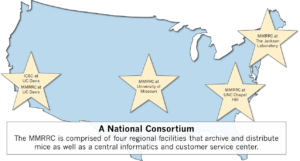MISSION:
The MMRRC at UNC distributes and cryopreserves scientifically valuable, genetically engineered mouse models of human development and disease to serve the biomedical research community. Since 1999 we have served as a member of an NIH funded national network of breeding and distribution facilities plus an information coordinating center serving together as NIH’s premier repository of spontaneous and induced mutant mouse and cell lines (https://www.mmrrc.org). 
The MMRRC aims to protect and enhance the mouse models, make them more accessible, and to support rigor and reproducibility in animal models research. Our mission also includes innovative research designed to enhance the resource.
Please contact our Customer Service at mmrrc_service@med.unc.edu if you have any problems or questions about accessing the information you need. The sections listed below may be of interest.
- Genotyping Protocols
A listing of the genotyping protocols available for strains held by MMRRC at UNC. - Health Reports
Health reports are available to all customers as PDFs and are updated as soon as new results are available. - Policy Information
All official MMRRC policy details can be found in this section.
NEWS
The MMRRC at UNC recently created a video primer on how to interpret a MiniMUGA Sample Report. This is the first in a planned series of videos that will show how the MMRRC uses MiniMUGA genotyping for Genetic Quality Control.
